
Find Help
More Items From Ergsy search
-

What are the common symptoms of hay fever?
Relevance: 100%
-

Is hay fever more common in urban areas?
Relevance: 83%
-

What is hay fever?
Relevance: 83%
-

Can hay fever symptoms mimic other conditions?
Relevance: 83%
-

Can diet influence hay fever symptoms?
Relevance: 83%
-

Hay fever advice | NHS
Relevance: 78%
-

Can hay fever be prevented?
Relevance: 77%
-
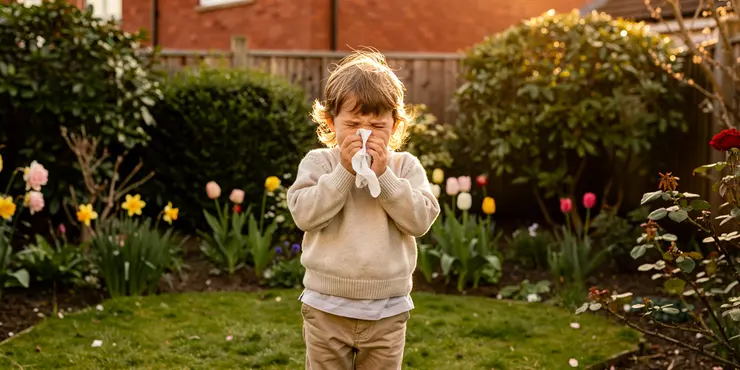
Can children develop hay fever?
Relevance: 77%
-

Is there a link between hay fever and asthma?
Relevance: 76%
-
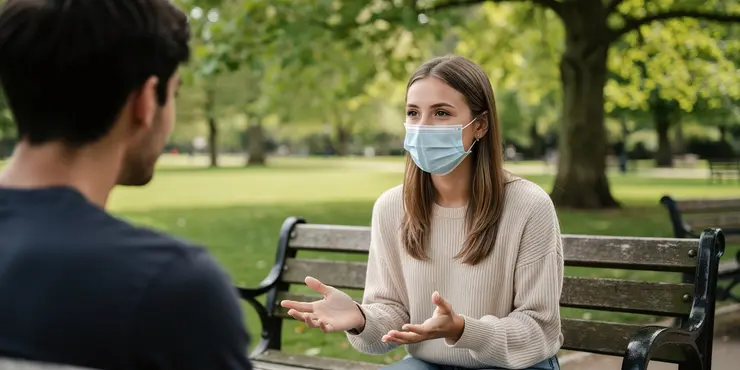
Do masks help with hay fever?
Relevance: 76%
-

Can hay fever occur year-round?
Relevance: 75%
-
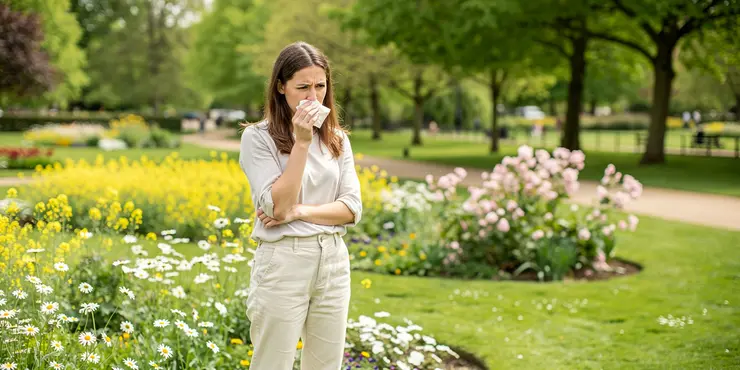
Are some people more prone to hay fever?
Relevance: 74%
-

Do pets contribute to hay fever?
Relevance: 73%
-

Antihistamines how they work with hay fever
Relevance: 72%
-

Can mosquito screens help reduce hay fever symptoms?
Relevance: 71%
-

Do all plants produce pollen that causes hay fever?
Relevance: 71%
-
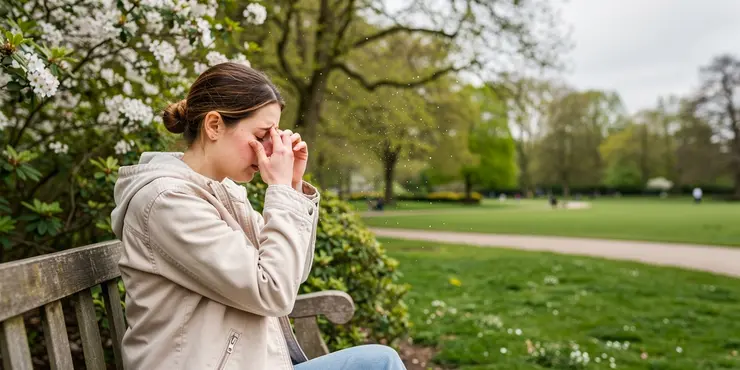
How does pollen affect people with hay fever?
Relevance: 71%
-

Self care - hay fever itchy eyes
Relevance: 70%
-

Why are experts warning of rising hay fever cases?
Relevance: 69%
-

Experts Warn of Rising Hay Fever Cases as Pollen Counts Surge
Relevance: 68%
-

Are there any treatments for hay fever?
Relevance: 55%
-

How long does a typical hay fever season last?
Relevance: 47%
-

What are the common symptoms of a cold?
Relevance: 43%
-

What are common symptoms of meningitis?
Relevance: 42%
-

What are the common symptoms of appendicitis?
Relevance: 41%
-

What are the common symptoms of lupus in children?
Relevance: 38%
-

How to treat glandular fever | NHS
Relevance: 36%
-

What are common symptoms of Lyme disease?
Relevance: 35%
-

Caring for a child with fever | NHS
Relevance: 34%
-

What are the common symptoms of Crohn's disease?
Relevance: 34%
-
What are common symptoms of menopause?
Relevance: 33%
-

Can dengue fever be contracted in the UK?
Relevance: 33%
-

What are common symptoms of a concussion?
Relevance: 33%
-
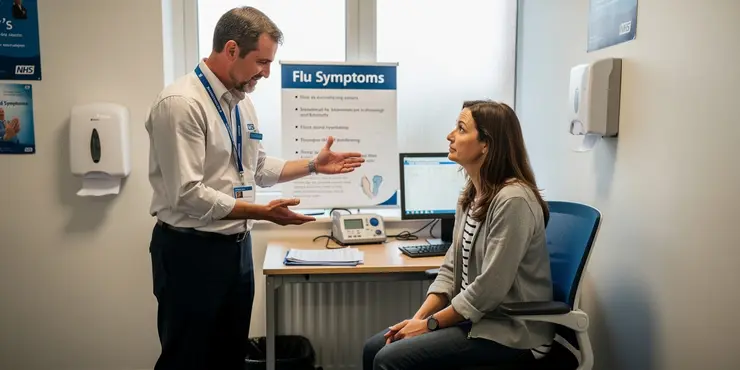
What are the symptoms of flu ?
Relevance: 32%
-

What are the common symptoms of asthma?
Relevance: 32%
-

Which medication should be avoided for children with fevers?
Relevance: 32%
-

What are the symptoms of Rubella?
Relevance: 32%
-

Is there a risk of yellow fever being spread by mosquitoes in the UK?
Relevance: 31%
-

What are the symptoms of measles?
Relevance: 31%
-

What are the symptoms of measles?
Relevance: 31%
Understanding Hay Fever Symptoms
Hay fever, also known as allergic rhinitis, is a common allergic condition affecting millions of people in the UK. It occurs when the immune system overreacts to airborne allergens, such as pollen. Understanding the symptoms of hay fever can help individuals identify the condition and seek appropriate treatment.
Common Symptoms of Hay Fever
Nasal Symptoms
One of the most prevalent symptoms of hay fever is nasal congestion. This can lead to a blocked or stuffy nose, making it difficult to breathe through the nostrils. In addition to congestion, those with hay fever often experience a runny nose, wherein clear, watery mucus frequently drips from the nose. Itching in the nose is another common symptom, often causing persistent scratching or rubbing of the nose to relieve the irritation. These nasal symptoms can contribute significantly to discomfort and interfere with daily activities.
Eye Symptoms
Hay fever often affects the eyes, leading to a range of symptoms. Red, watery eyes are a typical sign, as the body reacts to allergens. Itchiness in the eyes is also common, prompting people to rub their eyes frequently, which can exacerbate redness and irritation. Some individuals also experience swelling around the eyes, adding to the discomfort. These symptoms can be particularly bothersome and may impact activities such as reading or driving.
Sneezing
Sneezing is another hallmark symptom of hay fever. It often occurs in rapid, repeated bouts as the body attempts to expel the allergens from the nasal passages. Sneezing can be inconvenient and socially embarrassing, particularly in public settings. For those with hay fever, sneezing fits can occur suddenly and may be triggered by exposure to pollen.
Throat and Ear Symptoms
The throat may also be affected by hay fever, leading to symptoms such as itching or soreness. Some people experience a scratchy sensation in the throat, which can cause discomfort and interfere with speaking or swallowing. Additionally, hay fever can lead to itching in the ears, which can be particularly frustrating as it is difficult to alleviate.
Fatigue and General Well-being
In addition to these specific symptoms, hay fever can also impact overall well-being. The persistent discomfort and irritation can lead to fatigue, particularly if symptoms disrupt sleep. People with hay fever may feel generally run down or less energetic during the pollen season, affecting productivity and quality of life.
Conclusion
Recognizing these common symptoms of hay fever can help individuals take steps to manage their condition effectively. Consulting with a healthcare professional can provide tailored advice and treatment options to alleviate symptoms and improve quality of life during pollen season.
Understanding Hay Fever Symptoms
Hay fever is an allergy that many people get. It is sometimes called allergic rhinitis. It happens when your body reacts too much to things in the air, like pollen from flowers and trees. Knowing what hay fever feels like can help you find the right treatment.
Common Symptoms of Hay Fever
Nasal Symptoms
People with hay fever often have a stuffy nose. This makes it hard to breathe through the nose. You might also have a runny nose with clear liquid dripping out. Another common problem is an itchy nose, which might make you want to scratch or rub it a lot. These nose problems are annoying and can make it hard to do everyday things.
Eye Symptoms
Hay fever often makes your eyes red and watery. They may feel itchy too, which makes you want to rub them, but this can make things worse. Sometimes your eyes might also get puffy. These problems with your eyes can make it hard to read or drive.
Sneezing
Sneezing a lot is a big sign of hay fever. It happens because your body is trying to get rid of the pollen. Sneezing can happen suddenly and is often set off by pollen. It can be embarrassing, especially in public.
Throat and Ear Symptoms
Hay fever can make your throat feel itchy or sore. Sometimes it feels scratchy, which can bother you when talking or swallowing. Your ears might itch too, which is annoying because it's hard to scratch there.
Fatigue and General Well-being
Hay fever doesn’t just bother your nose and eyes. It can make you feel tired, especially if you can't sleep well. It might make you feel not as energetic or more tired during pollen season, which can make it hard to get things done.
Conclusion
Knowing these signs of hay fever can help you manage it better. Talk to a doctor to get advice and treatments that can help you feel better during the pollen season. They can help you find ways to reduce symptoms and improve how you feel.
Frequently Asked Questions
What are the most common symptoms of hay fever?
The most common symptoms of hay fever include sneezing, runny or stuffy nose, itchy eyes, nose or throat, and watery eyes.
Can hay fever cause persistent sinus congestion?
Yes, hay fever can lead to persistent sinus congestion due to inflammation and swelling in the nasal passages.
Is a cough a symptom of hay fever?
Yes, a cough can be a symptom of hay fever, often due to postnasal drip irritating the throat.
How does hay fever affect the eyes?
Hay fever can cause itchy, red, and watery eyes, which are symptoms of allergic conjunctivitis.
Can hay fever cause fatigue?
Yes, the symptoms of hay fever, such as nasal congestion and sleep disturbances, can lead to fatigue.
What's the difference between hay fever and a common cold in symptoms?
Hay fever symptoms include itchy eyes and nose and no fever, whereas a common cold may have a fever and body aches.
Are headache and facial pain symptoms of hay fever?
Yes, headaches and facial pain can occur with hay fever due to sinus pressure and congestion.
Can hay fever cause a sore throat?
Yes, postnasal drip caused by hay fever can lead to a sore or scratchy throat.
Is it normal to experience frequent sneezing with hay fever?
Yes, frequent sneezing is a very common symptom of hay fever.
Does hay fever cause ear pain or pressure?
Yes, ear pressure or discomfort can occur due to congestion and swelling affecting the Eustachian tubes.
How does hay fever affect the nose?
Hay fever typically causes a runny, itchy, and congested nose.
Are there any skin symptoms associated with hay fever?
While not common, hay fever can sometimes cause skin itching or hives in some individuals.
Can hay fever lead to loss of smell or taste?
Yes, congestion and inflammation from hay fever can temporarily reduce the sense of smell and taste.
Do people with hay fever experience more symptoms at a particular time of year?
Yes, symptoms often worsen during periods when pollen counts are high, such as spring and fall.
Is it possible for hay fever to cause breathing difficulties?
Some individuals may experience mild breathing difficulties if hay fever leads to significant nasal congestion.
Can hay fever cause a decrease in concentration or cognitive performance?
Yes, the fatigue and discomfort from symptoms can sometimes affect concentration and cognitive performance.
Are nighttime symptoms common with hay fever?
Yes, nasal congestion and other symptoms can worsen at night, disrupting sleep.
Do hay fever symptoms vary among different people?
Yes, the severity and specific symptoms of hay fever can vary widely from person to person.
Can stress exacerbate hay fever symptoms?
Stress can potentially worsen hay fever symptoms due to its impact on the immune system.
How long do hay fever symptoms typically last?
Hay fever symptoms can last as long as the individual is exposed to allergens, often peaking during specific seasons.
What happens when you have hay fever?
Hay fever can make you feel like you have a cold.
Here are some things to look out for:
- You might sneeze a lot.
- Your nose could feel blocked or runny.
- Your eyes may itch and water.
- You could get an itchy throat.
These are signs of hay fever. A doctor can help you if you need it.
Tip: Use tissues for your nose and wash your hands often.
Hay fever can make you sneeze a lot. Your nose might run, feel blocked, or itchy. Your eyes and throat might feel itchy too. Sometimes, your eyes might water.
Can hay fever make your nose feel stuffy for a long time?
Yes, hay fever can make your nose stuffy for a long time. This happens because the inside of your nose gets swollen and inflamed.
Can you get a cough from hay fever?
Yes, sometimes hay fever can make you cough. This happens because extra mucus (a sticky liquid) from your nose can bother your throat.
What does hay fever do to your eyes?
Hay fever can make your eyes sore and itchy. They might also get red and watery. If your eyes feel bad because of hay fever, you can try these things:
- Wear sunglasses outside to protect your eyes.
- Use special eye drops to help with itching.
- Try not to rub your eyes, because it can make them feel worse.
If you need help, ask an adult or a doctor.
Hay fever can make your eyes itchy, red, and watery. This is called allergic conjunctivitis.
Can hay fever make you tired?
Hay fever can make you feel tired. This happens because your body is fighting off things like pollen. This can use up a lot of your energy.
Here are some things that can help:
- Rest: Make sure to get enough sleep.
- Medicine: Use allergy medicine if your doctor says it's okay.
- Stay inside: Try to stay indoors when pollen levels are high.
Yes, hay fever can make you feel tired. It can make your nose feel stuffy and make it hard to sleep.
How can you tell if you have hay fever or a cold?
Hay fever and a cold have different signs. Here is how to tell them apart:
- Hay fever: This makes your eyes itchy and watery. You might sneeze a lot too. It happens when the air has a lot of pollen.
- Cold: You might have a cough, sore throat, and feel tired. You can have a runny nose and sneeze as well.
Tips to help you:
- Write down your symptoms to see what you feel.
- Notice when you feel worse. Hay fever is often worse when there is lots of pollen.
- See a doctor or ask a parent if you are unsure.
With hay fever, your eyes and nose might feel itchy, but you will not have a fever.
If you have a cold, you might get a fever and your body could ache.
Can hay fever make your head or face hurt?
Yes, hay fever can make your head and face hurt. This happens because your sinuses get full and tight.
Can hay fever make your throat sore?
Yes, when you have hay fever, it can make your throat hurt or feel scratchy because of postnasal drip.
Is it normal to sneeze a lot when you have hay fever?
Hay fever can make you sneeze a lot. This is normal. If you are worried, you can talk to a doctor.
Here are some things that might help:
- Use tissues to cover your nose.
- Wash your hands often.
- Try to stay indoors on windy days.
- Ask an adult about allergy medicine.
Yes, sneezing a lot is normal if you have hay fever.
Can hay fever make your ears hurt or feel full?
Yes, your ears can feel pressure or hurt because they are blocked or swollen inside.
What happens to your nose when you have hay fever?
When you have hay fever, your nose can feel itchy and stuffy. It might run a lot, like you have a cold.
Here are some tips to help you:
- Use a tissue to blow your nose gently.
- You can use a soft face cloth to wipe your nose.
- Try not to touch or rub your nose too much.
Hay fever makes your nose run, itch, and feel blocked.
Can hay fever make your skin feel different?
Sometimes, hay fever can make your skin itchy or give you red, bumpy spots called hives.
Can hay fever make you lose your sense of smell or taste?
Yes, hay fever can make it hard to smell and taste things for a little while.
Do people with hay fever feel worse at certain times in the year?
People with hay fever sneeze and have itchy eyes. Does this happen more when there are lots of flowers or grass?
Some tools and tips to help understand:
- Pictures: Look at pictures of seasons, like spring and summer.
- Stories: Read short stories about someone with hay fever.
- Videos: Watch videos about pollen and plants.
- Help from others: Ask a friend or family member for help.
Yes, signs often get worse when there is more pollen in the air, like in spring and fall.
Can hay fever make it hard to breathe?
Hay fever can sometimes make it hard to breathe. If you have hay fever, the airways in your nose might swell up, and this can make breathing tougher. Simple ways to feel better include:
- Using nasal sprays to clear your nose.
- Taking antihistamine tablets to stop itching and sneezing.
- Staying indoors when there's a lot of pollen outside, like on windy days.
If breathing is very hard for you, it's a good idea to talk to a doctor. They can offer more help.
Some people might find it a little hard to breathe if hay fever makes their nose very stuffy.
Can hay fever make it hard to focus or think clearly?
Yes, feeling very tired and not well can make it hard to focus and think clearly.
Do people often have hay fever symptoms at night?
Yes, having a stuffy nose and other problems can get worse at night and make it hard to sleep.
Do hay fever symptoms change for different people?
Hay fever can cause different symptoms for different people. Some may sneeze a lot, while others have a runny nose or itchy eyes.
Talking to a doctor can help understand your symptoms. You can also keep a diary to track when symptoms appear.
A helpful tool is a calendar to see what triggers your symptoms. Apps on your phone can also remind you to take medicine.
Yes, hay fever can make people feel different. Some might have it bad, and others not so much.
Can stress make hay fever symptoms worse?
When you feel stressed, it can make your hay fever worse. This happens because stress affects your body's defenses.
How long does hay fever usually last?
Hay fever is when you sneeze and your nose is itchy because of things like pollen in the air.
Most people have hay fever for a few weeks when the pollen is high.
Try things like wearing sunglasses and staying indoors to help feel better.
Hay fever makes you feel sick because of things in the air called allergens. You can feel bad for as long as those things are around. Usually, hay fever is worst at certain times of the year.
Useful Links
This website offers general information and is not a substitute for professional advice.
Always seek guidance from qualified professionals.
If you have any medical concerns or need urgent help, contact a healthcare professional or emergency services immediately.
Some of this content was generated with AI assistance. We’ve done our best to keep it accurate, helpful, and human-friendly.
- Ergsy carfully checks the information in the videos we provide here.
- Videos shown by Youtube after a video has completed, have NOT been reviewed by ERGSY.
- To view, click the arrow in centre of video.
- Most of the videos you find here will have subtitles and/or closed captions available.
- You may need to turn these on, and choose your preferred language.
- Go to the video you'd like to watch.
- If closed captions (CC) are available, settings will be visible on the bottom right of the video player.
- To turn on Captions, click settings .
- To turn off Captions, click settings again.
More Items From Ergsy search
-

What are the common symptoms of hay fever?
Relevance: 100%
-

Is hay fever more common in urban areas?
Relevance: 83%
-

What is hay fever?
Relevance: 83%
-

Can hay fever symptoms mimic other conditions?
Relevance: 83%
-

Can diet influence hay fever symptoms?
Relevance: 83%
-

Hay fever advice | NHS
Relevance: 78%
-

Can hay fever be prevented?
Relevance: 77%
-

Can children develop hay fever?
Relevance: 77%
-

Is there a link between hay fever and asthma?
Relevance: 76%
-

Do masks help with hay fever?
Relevance: 76%
-

Can hay fever occur year-round?
Relevance: 75%
-

Are some people more prone to hay fever?
Relevance: 74%
-

Do pets contribute to hay fever?
Relevance: 73%
-

Antihistamines how they work with hay fever
Relevance: 72%
-

Can mosquito screens help reduce hay fever symptoms?
Relevance: 71%
-

Do all plants produce pollen that causes hay fever?
Relevance: 71%
-

How does pollen affect people with hay fever?
Relevance: 71%
-

Self care - hay fever itchy eyes
Relevance: 70%
-

Why are experts warning of rising hay fever cases?
Relevance: 69%
-

Experts Warn of Rising Hay Fever Cases as Pollen Counts Surge
Relevance: 68%
-

Are there any treatments for hay fever?
Relevance: 55%
-

How long does a typical hay fever season last?
Relevance: 47%
-

What are the common symptoms of a cold?
Relevance: 43%
-

What are common symptoms of meningitis?
Relevance: 42%
-

What are the common symptoms of appendicitis?
Relevance: 41%
-

What are the common symptoms of lupus in children?
Relevance: 38%
-

How to treat glandular fever | NHS
Relevance: 36%
-

What are common symptoms of Lyme disease?
Relevance: 35%
-

Caring for a child with fever | NHS
Relevance: 34%
-

What are the common symptoms of Crohn's disease?
Relevance: 34%
-
What are common symptoms of menopause?
Relevance: 33%
-

Can dengue fever be contracted in the UK?
Relevance: 33%
-

What are common symptoms of a concussion?
Relevance: 33%
-

What are the symptoms of flu ?
Relevance: 32%
-

What are the common symptoms of asthma?
Relevance: 32%
-

Which medication should be avoided for children with fevers?
Relevance: 32%
-

What are the symptoms of Rubella?
Relevance: 32%
-

Is there a risk of yellow fever being spread by mosquitoes in the UK?
Relevance: 31%
-

What are the symptoms of measles?
Relevance: 31%
-

What are the symptoms of measles?
Relevance: 31%


